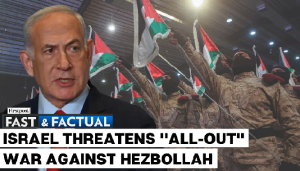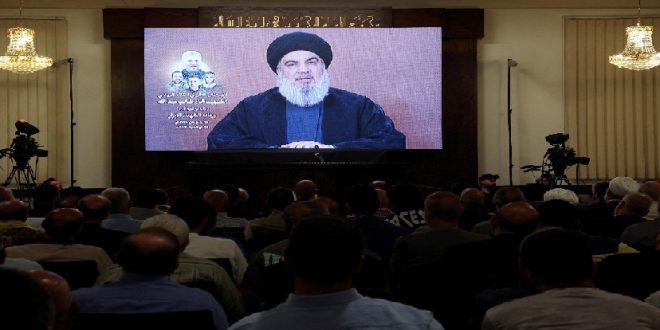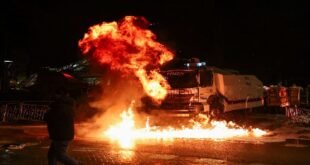24-06-2024
JERUSALEM/ BEIRUT: Full-scale war between Israel and Hezbollah would be “a catastrophe”, the UN Secretary-General says but to David Kamari, who lives under near-daily fire on the Israeli side of the border, it would be a solution.
Last month, a Hezbollah rocket fired from Lebanon landed in his front garden in the border town of Kiryat Shmona, cracking his house in several places and filling it with rubble.
 He points out the gaping holes where shrapnel sliced through the walls, missing him by inches and then to the hills above us, where Hezbollah-controlled territory begins.
He points out the gaping holes where shrapnel sliced through the walls, missing him by inches and then to the hills above us, where Hezbollah-controlled territory begins.
“Every day, every night: bombs. (It’s a) problem,” he said. “And I was born here. If you live here one night, you go crazy.”
David is still living in his rubble-filled house, pieces of shrapnel entangled with the remains of his television set. Outside is the blackened relic of his car, burned by the fire that swept through his front yard after the rocket hit.
Most of the population of Kiryat Shmona was evacuated after the 7 October Hamas attacks, as Hezbollah rockets began raining down in support of their Palestinian ally.
David is one of the few who stayed. “I’ve lived here 71 years,” he said. “I won’t go. I was in the army, I’m not afraid.”
His solution? “War with Hezbollah; kill Hezbollah,” he says.
Israel has been striking back hard against Hezbollah, killing senior commanders and hitting targets further inside Lebanon.
Hezbollah has sent larger volleys of drones and missiles across the border this month, and threats on both sides have increased. Earlier this week, the group published drone footage of military installations and civilian infrastructure in the Israeli city of Haifa.
Tough talk has long been part of a mutual strategy of deterrence, with both sides seen as wary of all-out war but as the tit-for-tat conflict grinds on, and more than 60,000 Israelis remain evacuated from their homes in the north, there are signs that both Israel’s leaders and its citizens are prepared to support military options to push Hezbollah back from the border by force.
 The mayor of Kiryat Shmona, Avichai Stern, shows me the site where a rocket hit a street near his office last week.
The mayor of Kiryat Shmona, Avichai Stern, shows me the site where a rocket hit a street near his office last week.
“I don’t think there is any country in the world would accept daily fire against its citizens,” Mayor Stern said and “sitting here like lambs to slaughter, waiting for the day they will raid us like we saw in the south, that’s not acceptable. Everyone understands that the choice is between war now and war later.”
The dangerous stalemate here hinges largely on the war Israel is fighting more than 100 miles (160km) to the south in Gaza.
A ceasefire there would help calm tensions in the north too, but Israel’s Prime Minister Benjamin Netanyahu is keeping both conflicts going, mortgaged by his promise to far-right government allies to destroy Hamas before ending the Gaza War.
Earlier this week even the Israeli military spokesman said this goal may not be realistic. “The idea that we can destroy Hamas or make Hamas disappear is misleading to the public,” Rear Admiral Daniel Hagari told Israeli TV.
On the Lebanese side of the border, where more than 90,000 people have been evacuated, the mood among those who have stayed is similarly grim.
Fatima Belhas lives a few miles (7km) from the Israeli border, near Jbal el Botm.
In the early days, she would shake with fear when Israel bombed the area, she says, but has since come to terms with the bombardments and no longer thinks of leaving. (Int’l Monitoring Desk)
 Pressmediaofindia
Pressmediaofindia




